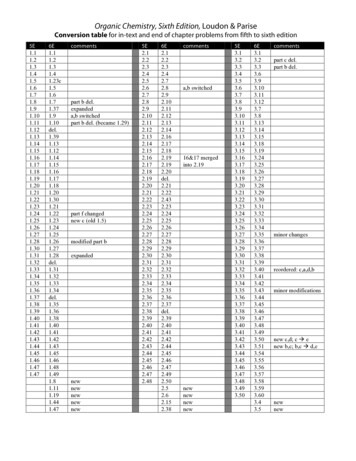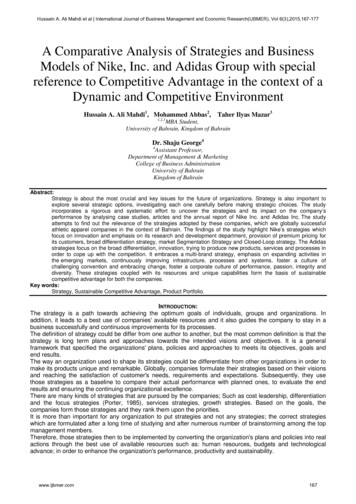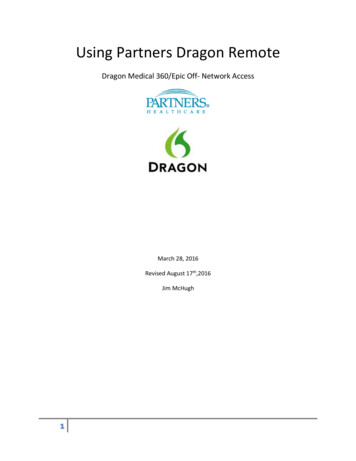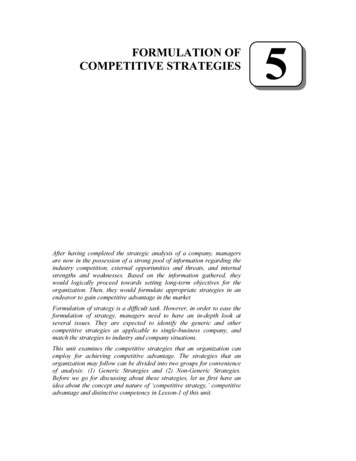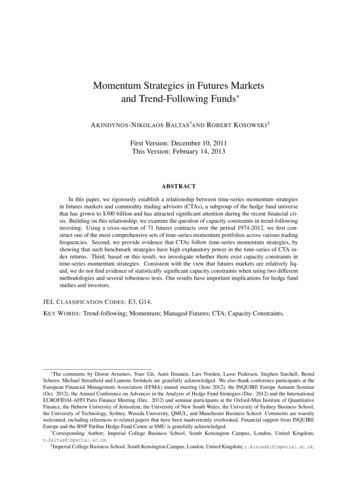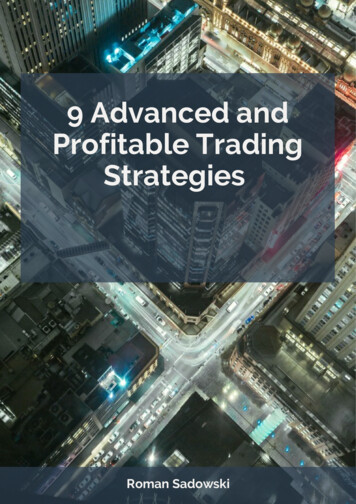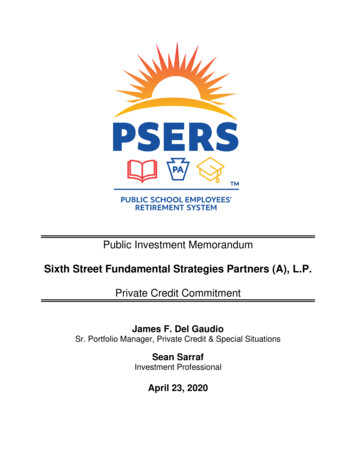
Transcription
Public Investment MemorandumSixth Street Fundamental Strategies Partners (A), L.P.Private Credit CommitmentJames F. Del GaudioSr. Portfolio Manager, Private Credit & Special SituationsSean SarrafInvestment ProfessionalApril 23, 2020
COMMONWEALTH OF PENNSYLVANIAPUBLIC SCHOOL EMPLOYEES’ RETIREMENT SYSTEMExecutive SummaryPSERS’ Investment Office Professionals (“IOP”), together with Aksia, recommend that PSERS invest 200million in Sixth Street Fundamental Strategies Partners (A), L.P. (the “Fund”). This recommendation isbased on our assessment of the investment strategy and our evaluation of Sixth Street Partners, LLC andits affiliates (“Sixth Street” or the “Firm”).Fund NameSixth Street Fundamental Strategies Partners (A), L.P.Firm NameSixth Street Partners, LLCTarget Fund Size / Hard Cap 2.0 billion / NoneRecommended Commitment Amount 200.0 millionExisting RelationshipYesSource of FundsCashAsset Class / Sub Asset ClassPrivate Credit / Distressed & Special SituationsInvestment Office OversightCharles J. Spiller, Deputy CIO / Non-Traditional InvestmentsJames F. Del Gaudio, Senior Portfolio ManagerExternal Consultant OversightAksia LLCSixth Street (formerly TPG Sixth Street Partners or TSSP) is a global credit and credit-related investmentplatform with 35 billion in assets under management as of December 31, 2019. Sixth Street was cofounded in 2009 by Alan Waxman (Managing Partner and Chief Investment Officer) and is currentlymanaged by 18 Partner Managing Directors and employs 250 professionals with offices in San Francisco,New York, Houston, Dallas, Boston, London, Hong Kong, Melbourne, and Luxembourg. Prior to formingSixth Street, Mr. Waxman was the Co-Head and Chairman of the Americas Special Situations Group(“AmSSG”) at Goldman Sachs (“GS”), where he also worked with seven of the other Sixth Street PartnerManaging Directors. Until recently, Sixth Street was a fully integrated investing platform within TPG Capital(“TPG”). However, in January 2020, Sixth Street and TPG together decided to pursue their respective nextphases as independent organizations, and the TSSP platform has been rebranded as Sixth Street Partners.This is the latest in a decade-long evolution of the relationship between the two firms as Sixth Streetautonomously controlled and managed its business prior to the separation.The Fund is targeting 2 billion in capital commitments and seeks to generate attractive risk-adjustedreturns primarily through the purchase of secondary stressed and distressed public credit along withopportunistic public situations investments (“Fundamental Strategies”). While the Fund is Sixth Street’s firstdedicated Fundamental Strategies vehicle, this effort is a continuation of strategies that Sixth Street hasemployed for over a decade within other Firm products. Through December 31, 2019, Sixth Street hasinvested 4.1 billion across more than 100 such investments and has generated a 24.0% gross IRR.PSERS and Sixth Street have a long-standing partnership dating back to the Firm’s inception andrepresents PSERS’ second largest total exposure (NAV plus unfunded commitments) across the PrivateCredit portfolio at 1.07 billion as of December 31, 2019 (including the recently activated TAO Contingentvehicle). To date, PSERS has committed 1.2 billion across five Sixth Street-managed funds including: 100 million to TPG Opportunities Partners II (A), L.P. in 2011 (“TOP II”) 150 million to TPG Opportunities Partners III (A), L.P. in 2014 (“TOP III”) 150 million to TSSP Opportunities Partners IV (A), L.P. in 2018 (“TOP IV”) 100 million to TOP NPL (A), L.P. in 2012 700 million to TSSP Adjacent Opportunities Partners via three separate tranches (TAO 2.0/2014,TAO/3.02015, and TAO Contingent/2018) of the PSERS TAO Partners Parallel Fund, L.P. (the“PSERS TAO”).Sixth Street Fundamental Strategies Partners (A), L.P.Page 1
COMMONWEALTH OF PENNSYLVANIAPUBLIC SCHOOL EMPLOYEES’ RETIREMENT SYSTEMInvestment TeamSixth Street was co-founded in 2009 by Alan Waxman and is currently managed by 18 Partner ManagingDirectors and employs 250 professionals. The Fundamental Strategies team within Sixth Street consistsof 14 investment professionals, with global leadership from Bornah Moghbel, Sixth Street Co-FoundingPartner and Co-Head of Global Corporate Investing. Each member of the Fundamental Strategies teamhas spent the majority of his or her career focused on corporate credit investing. In aggregate, the Firm has 140 investment professionals based in San Francisco, New York, Houston, Dallas, Boston, London, HongKong, and Melbourne. Sixth Street operates under a “one-team” construct, in which team members havekey focus areas but frequently act as generalists and are incentivized to share opportunities across theplatform, independent of specific vehicles or strategies, when sourcing and underwriting potentialinvestments.Market OpportunityNotwithstanding the COVID-19 crisis, substantial risks were already building in the financial system overthe last several years, setting the stage for a compelling investment opportunity set for FundamentalStrategies. According to Sixth Street, the historically prolonged economic expansion ( 12 years) and chasefor yield has led many lower quality, and/or short-term focused asset managers to continue investing inriskier and highly levered secondary and originated debt transactions. These risk factors include: (1) therapid growth of corporate debt outstanding, (2) increasing leverage ratios among corporate issuers, and (3)worsening legal protections in credit documents (i.e. covenant-lite).In March 2020, following the longest economic expansion in American history, risk assets rapidly repricedin the face of the COVID-19 crisis. As of April 2020, the COVID crisis continues to significantly impactindividuals and families in tragic ways. In parallel, financial markets are rapidly evolving in a fashion wehave not seen previously, including during the 2008 Global Financial Crisis (“GFC”). As of this writing, datacoming from around the world is too mixed to be able to narrow the band of outcomes on so many of theobvious questions about COVID-19. However, PSERS’ IOP agree with Sixth Street that while this is a publichealth crisis first, there is a real and looming potential for it to spill over into a full‐on credit and liquiditycrisis. Should this occur, it could create an even greater investment opportunity set for the Fund given itsfocus on stressed/distressed public credit. According to Aksia’s 2020 Private Credit Annual StrategyOutlook, COVID-19 is catalyzing global credit issues across both large cap and middle market sectors, anda large corporate opportunity set is developing in the U.S. levered loan and high yield space. As such, Aksiacurrently recommends overweighting Distressed & Special Situations strategies.Asset price volatility periodically flares up and can arise from multiple sources including, but not limited to,industry disruption, more restrictive central bank policy, recessions, geopolitical events, and widespreadflight-to-quality environments. Windows of opportunity can also arise in challenged sub-sectors even in theabsence of a broader economic downturn. The effects of the post-GFC regulatory environment andresulting changes to market structure have also altered the competitive landscape. PSERS’ IOP and SixthStreet have observed the following changes to market structure: (1) the disintermediation of banks by thecapital markets and alternative capital managers, (2) decreased competition from traditional hedge fundplayers, and (3) the growth of passive investing and indexing. As a result, Sixth Street is well-positioned totake advantage of dislocations given the current structural backdrop. While credit and liquidity crises arenot desirable for existing assets in terms of mark-to-market valuation and potential impairment risk, it ishighly desirable to arm high-conviction managers such as Sixth Street with dry powder to take advantageof market dislocations in order to generate attractive future returns.The following exhibits further illustrate the above-mentioned risk factors which have the potential to createfuture periods of heightened volatility in credit markets, and in turn, may serve to generate compelling alphaoriented return opportunities for the Fund.Sixth Street Fundamental Strategies Partners (A), L.P.Page 2
COMMONWEALTH OF PENNSYLVANIAPUBLIC SCHOOL EMPLOYEES’ RETIREMENT SYSTEMRapid Growth of Corporate Credit MarketsLeveraged finance markets have grown substantially since the Global Financial Crisis, now reaching 3 trillion insize across high yield and leveraged loan markets in the U.S. and Europe. The leveraged loan market has morethan doubled over the past 10 years as the CLO (collateralized loan obligation) industry has absorbed significantcapital inflows.Source: Compiled by Sixth Street based on data from JP Morgan as of 12/2019. Includes US and European High Yield Bonds and Leveraged Loans.The BBB segment of the investment grade market has seen even more rapid growth than leveraged finance andnow constitutes nearly 3 trillion of debt. Technical selling around deteriorating credit quality for investment gradebonds has emerged as a source of opportunity for the Fundamental Strategies team. The BBB segment of theinvestment grade market has outpaced the growth of high yield and is now 2.8x the size of the high yield market.According to Sixth Street, this outsized ratio means that supply-demand dynamics in future downgrade cycles havethe potential to cause severe disruption in high yield, stressed, and distressed debt markets.Source: Compiled by Sixth Street based on data from Deutsche Bank, Bloomberg Finance LP, BAML/ICE. As of 10/2019, based on USD BBB/HY as of 12/2019.Using prior downgrade cycles as a guide and overlaying them on today’s markets, Sixth Street believes that thesupply of downgraded investment grade bonds (i.e. fallen angels) could be 20x greater than previous periods ofdistress. This projected amount of supply could grow the high yield market by approximately 660 billion, or 45%according to JP Morgan.Sixth Street Fundamental Strategies Partners (A), L.P.Page 3
COMMONWEALTH OF PENNSYLVANIAPUBLIC SCHOOL EMPLOYEES’ RETIREMENT SYSTEMIncreasing Corporate LeverageIncreasing levels of corporate leverage are another risk factor that may contribute to the duration and severity of thenext dislocation. Bank loans now stretch deeper into the capital structure with less subordinated debt providing acushion than at any point in history. At the same time, total leverage levels are at all-time highs. At 5.1x EBITDA,average total leverage multiples for large corporate loans are above the pre-GFC peak levels. Within the investmentgrade market, leverage is also rising. In fact, 43% of BBB-rated debt is now levered over 4x. According to SixthStreet, a leverage multiple of more than 4x has historically been indicative of sub-investment grade credit, implyingthat nearly half of BBB-rated debt should be considered high yield based on leverage ratios alone.Source: Compiled by Sixth Street based on Bloomberg data. As of 11/2019. Data includes non-financial, BBB-rated companies in the S&P 1500 index; Leverage defined asgross debt dividend by adjusted EBITDA.Worsening Credit Documentation StandardsThe global reach for yield has caused a desire for investors to put capital to work, even if that means accepting substandard legal protections. Historically, investors in the leveraged loan market benefitted from financial covenantsprotecting them if company performance deteriorated. Investors have forsaken their rights to these covenants andnow accept documentation alterations that are increasingly beneficial to issuers at the expense of investors. Thechart below shows the prevalence of covenant-lite issuance, which has now become the market standard.Note: Compiled by Sixth Street based on data from JP Morgan, as of 01/2020.As investors become increasingly willing to accept worse protections, corporate issuers have in turn become moreaggressive in their forecasting assumptions. An S&P analysis of 42 LBO transactions in 2019 compared EBITDAprojections when the LBO transactions were marketed to actual performance two years later. The study showedevidence of aggressive forecasting assumptions. A staggering 94% of the LBO transactions missed their EBITDAprojections. In many instances, the degree of the miss was substantial, with 52% of the LBO transactions missingEBITDA projections by 33%, and 32% of the transactions missing EBITDA projections by over 50%. See graphic onthe following page.Sixth Street Fundamental Strategies Partners (A), L.P.Page 4
COMMONWEALTH OF PENNSYLVANIAPUBLIC SCHOOL EMPLOYEES’ RETIREMENT SYSTEMNote: Compiled by Sixth Street based on data from S&P analysis of 42 LBO and M&A transactions originated during 2016.Numbers show companies’ actual 2018 performance relative to management projections presented at deal inception.Source: S&P, When The Cycle Turns: The Continued Attack of The EBITDA Add-Back.Aggressive EBITDA forecasts have increased the risk to the debt investing community. Secured lenders haveeffectively granted credit at higher leverage and greater risk than they anticipated due to the diminished profitpotential of their borrowers. Looking at the same LBO transactions in 2016 and comparing the leverage forecastswith actual outcomes two years later, we can see that 90% of the transactions missed their leverage forecasts aswell.Note: Compiled by Sixth Street based on data from S&P analysis of 42 LBO and M&A transactions originated during 2016.Numbers show companies’ actual 2018 performance relative to management projections presented at deal inception.Source: S&P, When The Cycle Turns: The Continued Attack of The EBITDA Add-Back.Investment StrategySixth Street expects to invest in the secondary or public markets with most investments concentrated instressed and distressed credit, opportunistic public situations, and “2-step” solutions. Consistent with theinvestment process employed across Sixth Street, Fundamental Strategies is expected to target a longterm oriented, downside-protected strategy focused predominately on “first-dollar” investments acrossgeographies and industries. Sixth Street will employ a flexible, thematic approach to sourcing and investing,allowing them to migrate into and out of investment themes, sub-sectors, geographies and various parts ofthe capital structure in an economic and credit cycle-aware manner. The business model is predicated onapplying the “Sixth Street Playbook” to investments in the secondary market by (i) the early identification ofinvestment themes, (ii) consistent execution of their tested process to evaluate themes and identifyinvestment opportunities with favorable dynamics, and (iii) ultimately migrating away from themes wheninvestment conditions become less attractive. Sixth Street may also selectively invest in primaryinvestments or other illiquid situations that arise from its thematic approach to investing. Sixth Streetexpects to build a portfolio of 20-30 core positions, and investment sizing will be scaled up or down basedon the level of conviction and attractiveness of the risk/reward skew. In terms of geographic exposure, SixthSixth Street Fundamental Strategies Partners (A), L.P.Page 5
COMMONWEALTH OF PENNSYLVANIAPUBLIC SCHOOL EMPLOYEES’ RETIREMENT SYSTEMStreet currently expects 10-30% of new investments to be sourced from outside the U.S., largely fromdeveloped markets such as Europe, Australia, New Zealand, and Canada.The table below summarizes the Fund’s three primary opportunity sets:Opportunity SetDescription Target senior portions of the capital structureStressed Public Credit(“Corporate Stressed”) Typically consist of leveraged loans and bonds secured by a lien on a company’sassets that offer substantial downside protection and attractive long-term riskadjusted returns Downside protection may come in several forms, including via asset value that isuncorrelated to the core operating business, high cash-yielding assets, collateral inunrelated businesses, or low exposure relative to the value of the collateral orunderlying intrinsic value Seek investments that maximize risk/reward skew through mix of downsideprotection coupled with upside optionalityDistressed Public Credit(“Corporate Distressed”) Targets themes and businesses that are (a) misunderstood by the market, (b) undermanaged, (c) experiencing cyclical or secular headwinds, or (d) impacted byidiosyncratic events Seeks to create the underlying businesses at deep discounts to intrinsic value andtarget fulcrum security where the team expects opportunity to lead a restructuringprocess and ultimately improve the business trajectoryOpportunistic PublicSituations and“2-Step” Solutions Through-the-cycle opportunities that typically offer less correlated return streams both to the rest of the portfolio and, in many cases, to the overall macroeconomicenvironment “2-step” refers to a transaction where an initial investment in a company leads theteam to build conviction and then to identify or create a second opportunity to investInvestment Structure:Sixth Street seeks to generate strong alpha-oriented returns across multiple market cycles, and theFundamental Strategies portfolio will generally be constructed to target gross returns in the mid to highteens and 1.4x-1.8x Gross Multiple on the fund overall. Sixth Street expects a significant portion of theportfolio will be cash generative either through contractual cash payments (e.g., interest, amortization) orother consistent realization events. Since inception, cash generating investments have made up roughly73% of the historical Fundamental Strategies investments and have been underwritten to a year-one cashyield of 6%. Cash generative investments help accelerate payback periods, minimize volatility, and narrowthe expected range of outcomes in cases where underwriting models rely on accrued gains or multipleexpansion to drive returns. Sixth Street expects a significant portion of the portfolio will be first-dollar ornear-first-dollar risk (meaning they are made at or near the top of the capital structure or have a first lien on assets)as they construct a portfolio focused on capital preservation. In the historical Fundamental Strategiesinvestments, 88% of the portfolio exhibits first or near-first-dollar attachment, while 62% of the portfolio hasdownside protection via liquidation preference. While the Fundamental Strategies team expects much ofthe portfolio to be in debt securities, certain investments may offer upside convexity given purchases pricesbelow par.Aside from a subscription facility utilized to reduce the administrative burden on investors by aggregatingcash movements over short periods of time, Sixth Street does not anticipate using financial leverage in thisstrategy. In terms of FX management, Sixth Street expects to hedge all non-USD positions back to USDusing rolling forward currency sales to protect against declines in the value of investments or commitmentsas a result of fluctuations in currency exchange rates.Sixth Street Fundamental Strategies Partners (A), L.P.Page 6
COMMONWEALTH OF PENNSYLVANIAPUBLIC SCHOOL EMPLOYEES’ RETIREMENT SYSTEMInvestment InstrumentsFundamental Strategies investments will typically consist of bank debt (i.e. leveraged loans) or bondssecured by a lien on the company’s assets.Portfolio FitThe Fund will be allocated to the Distressed & Special Situations bucket of PSERS’ Private Credit portfolioand the table below summarizes PSERS’ projected exposure inclusive of a recommended 200 millioncommitment:InvestmentType ( M)Distressed &Special SituationsNAVUnfunded1%TotalExposure1%% 2,266.942.7% 1,463.245.8% 3,730.043.9%1,250.223.6%576.718.1%1,826.921.5%Real Estate .1%258.18.1%739.88.7%Real Assets Credit459.08.6%157.34.9%616.37.3%Structured Credit508.19.6%0.00.0%508.16.0%Direct LendingSpecialty FinanceTotal79.61.5%0.00.0%79.60.9% 5,306.5100.0% 3,192.6100.0% 8,499.1100.0%(1) Include post Q4’2019 pending/closed commitments.A commitment to the Fund allows PSERS to broaden its relationship with a high-conviction manager thatis well-positioned to execute their investment strategy during the current, complex market environment. TheFund’s return target meets the return objective for PSERS’ Private Credit portfolio of generating doubledigit net returns over the life of the investment. Given the current market environment, the Fund has thepotential to generate outsized returns relative to our typical 9% - 13% net target.Investment Highlights Experienced & Cohesive Senior Management Team / Established PlatformBroader / More Attractive Risk-Adjusted Return Opportunity as a Result of COVID-19 CrisisStrong Fundamental Strategies Track RecordDiverse Capability Set and Flexible Strategy Enables Migration Throughout the Credit CycleDownside - Focused MindsetRestructuring CapabilitiesWell-Resourced Back & Middle OfficeInvestment / Risk Considerations Impact of Central Bank Intervention on Market OpportunityPSERS‘ Existing Exposure to Fundamental Strategies InvestmentsSixth Street Disaffiliation with TPG CapitalKey Person ProvisionSixth Street Fundamental Strategies Partners (A), L.P.Page 7
COMMONWEALTH OF PENNSYLVANIAPUBLIC SCHOOL EMPLOYEES’ RETIREMENT SYSTEMInvestment Committee DisclosureRelationship with AksiaAksia represents both non-discretionary and discretionaryclients with commitments to various Sixth Street-managedinvestments. It is not yet known if additional Aksia clients willcommit to this Fund.Introduction SourceFund SponsorPlacement AgentNo third-party placement agentPA Political ContributionsNone DisclosedPotential ConflictsNone DisclosedPSERS History with the Investment ManagerYes, PSERS previously committed 1.2 billion across fiveTSSP-managed partnerships.Litigation DisclosureSixth Street receives communications from regulators and isinvolved in litigation from time to time in the ordinary course ofbusiness. PSERS is not currently aware of any litigation whichhas or may have a material effect on the Fund.PSERS Allocation Implementation Committee ApprovalApril 23, 2020Sixth Street Fundamental Strategies Partners (A), L.P.Page 8
Manager Recommendation MemoApril 21, 2020Board of TrusteesCommonwealth of Pennsylvania, Public School Employees’ Retirement System (“PSERS”)5 North Fifth StreetHarrisburg, PA 17101Re: Sixth Street Fundamental Strategies Partners (A), L.P.Dear Trustees:Aksia LLC (“Aksia”), having been duly authorized by the Board of PSERS, has evaluated and hereby recommends, in line withPSERS’ Investment Policy Statement and Private Credit Policy, a commitment of up to 200 million to SixthStreet Fundamental Strategies Partners (A), L.P. (the “Fund”).Sixth Street Partners, LLC (“Sixth Street”) (formerly TPG Sixth Street Partners or TSSP) is a global credit and credit-related investmentplatform with approximately 35 billion in assets under management as of December 31, 2019. Sixth Street was founded in 2009by Alan Waxman (Managing Partner and Chief Investment Officer) and other former senior professionals from Goldman Sachs’Special Situations Group.The Fund is Sixth Street’s first standalone vehicle for its Fundamental Strategies offering, although Fundamental Strategies is a substrategy that has existed since the firm’s inception within TSSP Adjacent Opportunities (vehicles collectively referred to as “TAOGlobal”), TSSP Opportunities (“TOP”), and TSSP Specialty Lending (“TSLX”). The Fund is targeting a 2 billion capital raise and willfocus on (i) stressed public credit, (ii) distressed public credit, and (iii) “2-step” and other opportunistic/special situations. Sixth Streetbelieves that high-quality businesses are repricing and trading at stressed levels, which provides an opportunity for the Fund to buysound credits at attractive levels, with optionality for shorter duration given multi-year underwritten hold periods by the manager.Aksia believes Sixth Street to have a strong, established platform with an experienced team. As a firm Sixth Street has generatedstrong returns across its various credit-oriented investment products. Fund investors will benefit from the GP’s global originationefforts, relationships and experienced investment and operating professionals. Across the market Sixth Street has demonstrated anability to identify proprietary opportunities on a global basis and within different sectors, and they have experience drivingrestructurings in the event that the investment landscape evolves into more credit market stress, including credit downgrades,defaults, and bankruptcies.In addition to the above, Aksia believes this is a compelling time to commit to the Fund because the repercussions of the COVID19 pandemic have created opportunities in distressed debt that have not existed since the Global Financial Crisis.Aksia’s recommendation is based upon the following analytical factors and is made within the context of PSERS’ investmentguidelines: Due diligence of the Fund’s investment process, including a review of the sponsor, investment strategy, market positioning,investment personnel, and risk management;o Most recent investment due diligence review conducted March 18th, 2020 and April 9th, 2020. Due diligence of the Fund’s operations, including a review of its organizational structure, service providers, regulatory andcompliance, LPA and financial statement analysis;o Most recent operational due diligence review conducted April 8th, 2020. Evaluation of the Fund’s strategy within the context of the current investment environment; and Appropriateness of the Fund’s strategy as a component of PSERS’ portfolio.This recommendation is given solely for the benefit of PSERS and cannot be relied upon by other investors considering an investmentin the Fund, since their needs, objectives, and circumstances may not be identical to those of PSERS. Aksia managerrecommendation memos should be reviewed with other Aksia due diligence materials, including the due diligence reports. Inaddition, please consult your tax, legal and/or regulatory advisors before allocating to any private investment fund.Please feel free to contact us should you have any questions about this recommendation.
Respectfully,Partner, Head of Credit StrategiesSimon FludgatePartner, Head of Operational Due Diligence
PSERS and Sixth Street have a long-standing partnership dating back to the Firm’s inception and represents PSERS’ second largest total exposure (NAV plus unfunded commitments) across the Private Credit portfolio at 1.07 billion as of December 31, 2019 (including the rec

